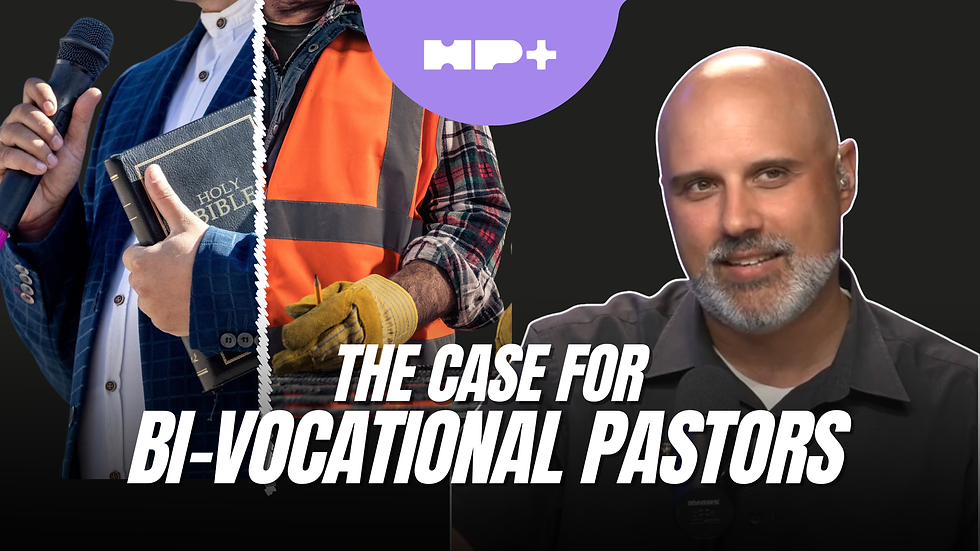Should Pastors Be Required to Have Work Experience Outside the Church?
- Holy Post

- Oct 5, 2025
- 4 min read
In this clip from the Holy Post Plus series My Hill to Die On, Skye argues that pastors should be required to have work experience outside of ministry. What insight, exposure, and wisdom are pastors missing when they spend all their working hours in a church/ministry setting, while most of their congregation is not? Watch more My Hill to Die On at holypost.com/plus!

Skye: My hill to die on is: I believe that pastors should be required to have significant work experience apart from ministry—either before they enter ministry or while in ministry in a bi-vocational way.
Phil: Like required military service?
Skye: That could be one. Peace Corps. Podcasting. Maybe McDonald’s. And I say this as somebody who did not have that.
Phil: And boy, would you be a better person if you had!
Skye: Well, one of the things is I went straight from undergrad to seminary to ministry. There’s a number of us who go through that kind of pipeline—
Phil: To scandal. To restoration. To podcasting.
Skye: Thankfully not scandal. Thankfully not. But when I left pastoral ministry to do other things, it profoundly changed my outlook on how I had been a pastor. I wish I’d had that experience before becoming a pastor. Part of being a pastor is shepherding people. And when you have no way of relating to their lives—because you don’t know what it’s like to have a 9-to-5 job, or be in a secular workplace—I think that limits your ministry. Too much of pastoral work today is stuck inside the church building, running programs, inviting people into their environment, rather than pastors spending meaningful time outside the church in the fields—metaphorically speaking—with the sheep, where they actually live and work.
Kaitlyn: They should literally be shepherds before becoming pastors.
Skye: Exactly. I saw the effect on me as a younger pastor—the naivete, the ridiculous expectations I had. Once I worked outside the church, the light bulb went on. I realized I hadn’t known what people were really living through when I was trying to teach and guide them. There's wisdom that comes from that kind of experience. I admire bi-vocational ministers. It’s an undervalued reality. I wish seminaries or churches were structured to make that possible.
I remember talking to a pastor who tried to spend more time outside the church building in the community. The elders reprimanded him: “We’re not paying you to go out there. We’re paying you to run programs.” That mindset—the professionalization of ministry—works against shepherding people where they actually are.So my hill to die on: we need ministry models that are healthier for pastors, and better for the people, by having pastors who understand what it’s like in their communities.
If you’re in a town where the biggest employer is a car manufacturing plant, as a pastor you should know what that plant is like. You should be there regularly. You should know the people who work there. You should know the leaders. You have to get out in the community. Sticking a pastor in an office all day doesn’t lead to the best ministry. Yes, there are exceptions, but in general, I think it’s much healthier for pastors to have that experience.
Phil: Kaitlyn, of course, disagrees.
Kaitlyn: I don’t totally disagree. I just think it’s been a consistent model in Christian history that some people serve their whole lives in professional ministry.
Skye: True. But prior to 1950, most ministers, priests, whatever, spent most of their week outside the church. That’s what’s changed. There wasn’t programming all week long. They gathered people for worship on Sunday, and the rest of the week pastors were in prisons, hospitals, fields, factories, homes—ministering to people. That’s a different hill I might bring in later—my whole thing about sermon-centric Sundays. But when I left my church role and spent more time in the pew, my kids were young, my family busy, I was working 40–50 hours a week in a regular job. And on Sundays, I felt assaulted.
Over and over—from the worship leader, from the pastor, in the sermon—it was one thing after another the church wanted me to do. “Serve in this.” “Sign up for that.” “Be on this team.” And I thought: are you kidding me? Do you have any idea what my life is like? How little margin I have? And yet I realized I had done the exact same thing when I was in the pulpit. It came from ignorance. My whole world was the church, so I assumed everyone else’s world should be too. I had no empathy for people trying to raise a family, hold down a job, make ends meet. I wasn’t compassionate about their realities. It wasn’t until I got outside my narcissistic little ministry bubble that I saw what my people were living through. It changed my whole approach. I wish I’d learned that sooner.
Phil: We’ve been enjoying you much more since you stopped being a narcissist.
Skye: Thank you, Phil.
Phil: I applaud you. And I think we should have a Holy Post ice cream shop someday. We’ll sell Diet Dr. Pepper and “sermon-centric sundaes.”
Skye: That’s funny.


Comments